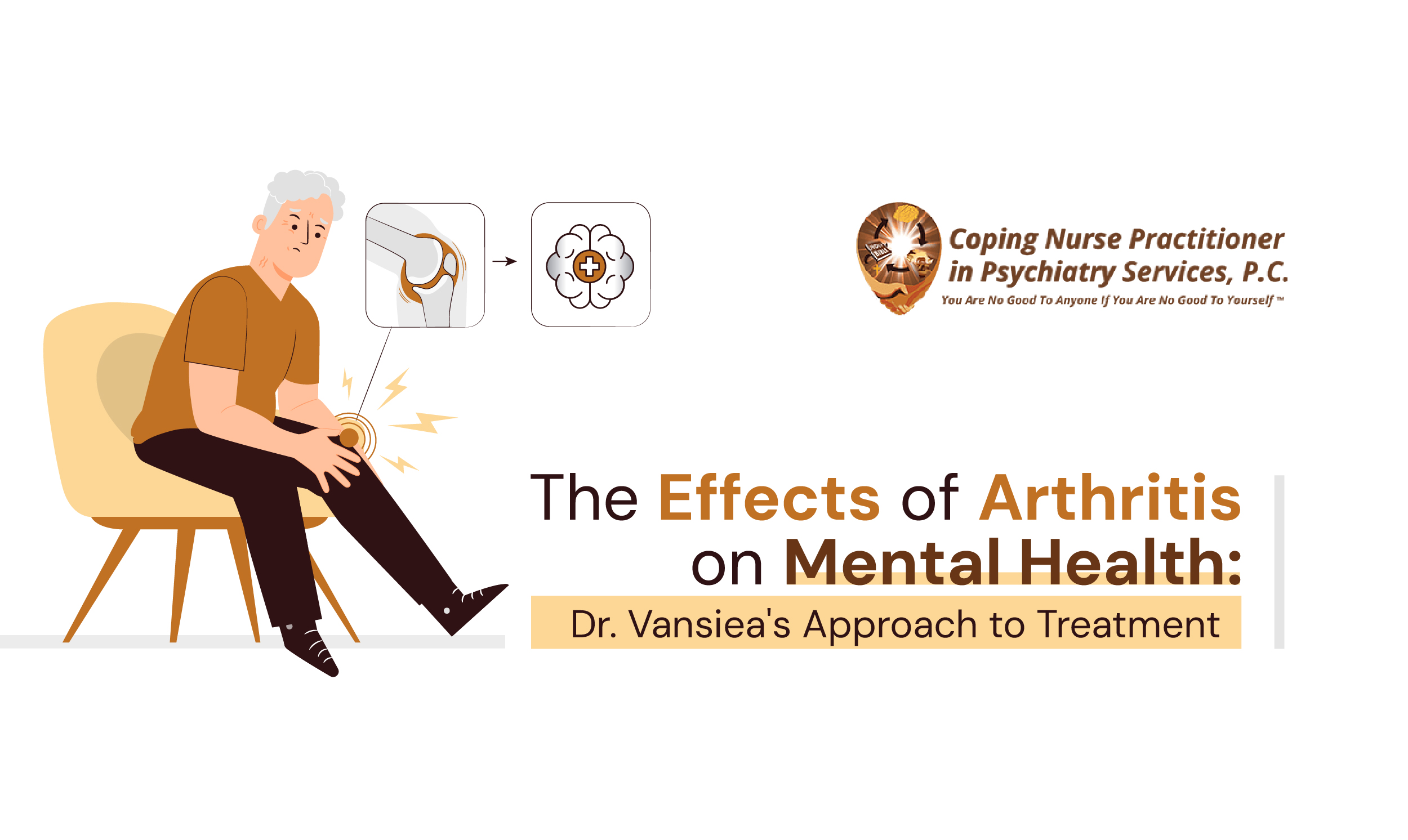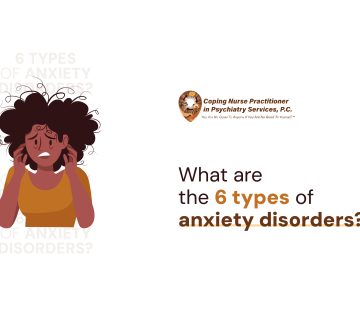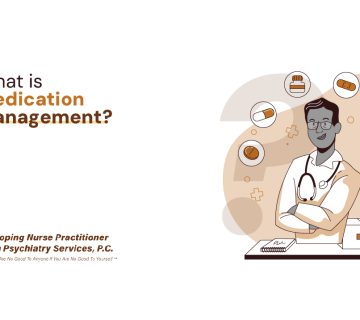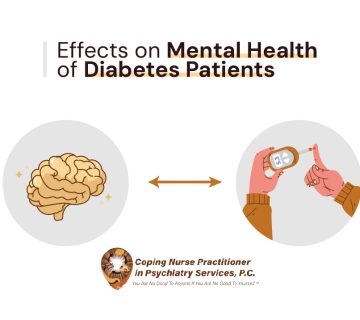If you find yourself feeling overwhelmed, anxious, or down because of your arthritic condition, please know that it is natural to feel these emotions.
Arthritis has a way of bringing up a lot of difficult emotions that can weigh heavy on the heart.
Dr. Vansiea is a caring and compassionate psychiatric nurse devoted to lifting your spirits on your mental health healing journey. She understands how chronic medical issues affect the mind.
Dr. Vansiea provides telehealth sessions you can schedule to get support at your convenience.
She provides helpful methods to:
- Ease arthritis-related anxiety and depression.
- Improve how you believe in yourself, even when you feel pain.
- Help you find acceptance.
- Adapt to changes while protecting your well-being.
- Maintain a positive mindset through mindful practices.
- Help you rest and sleep well during restless nights.
Don’t suffer in silence — Coping Nurse Practitioner in Psychiatry Services offers support.
The Approach Dr. Vansiea Takes to Treat Patients With Anxiety struggling from Arthritis
Dr. Vansiea focuses on a holistic approach to managing anxiety from arthritis and is deeply aware of how the condition affects the body and mind.
- In her practice, she creates an affirming space where patients can candidly discuss their struggles without experiencing judgment.
- In recognition of the interwoven nature of mental, emotional, and physical well-being, Dr. Vansiea performs thorough evaluations to formulate her care plan. She provides talk therapy, support, clinical recommendations, lifestyle recommendations, helpful coping mechanisms, and spiritual practices when necessary.
- The therapy process focuses on resolving the connection between anxiety and pain through practices like mindfulness, acceptance, and commitment therapy, along with other treatments that work together as a whole.
- She helps patients process difficult feelings while regaining a sense of control, hope, and purpose in living with a chronic condition.
Make an appointment for a consultation with Dr. Vansiea today if you’re feeling low or hopeless due to arthritis.
Arthritis and Anxiety
There’s more to living with arthritis than just physical pain; it’s an emotional experience as well.
Some days, your body seems to cooperate, while others leave you unsure of what to do.
It’s perfectly normal to find yourself worrying, experiencing stress, or feeling under a heavy cloud of sadness now and then. I once used to feel this way living with chronic pain and joint issues.
When arthritic pain flares up, it can put a shadow over your mood, bringing anxiety and stress that weren’t there before.
The constant flare-ups don’t make the struggle any easier to bear.
Research, like that from the American Psychological Association, shows that it’s common for those with arthritis to engage in these silent emotional tussles.
It’s a difficult process, indeed, but recognizing these emotions as natural reactions to your condition is essential towards grasping the support and care that’s essential to your health.
How Arthritis Affects Mental Health
Although most people know the physical toll arthritis takes on the body, its effects on mental well-being are less recognized.
The constant pain and changes arthritis brings can seriously influence emotional health if left unattended and better controlled as Dr. Vansiea has a personal history with health challenges.
As someone coping with a chronic condition, it’s important to understand how arthritis impacts your mind.
This is how arthritis can affect one’s mental health:
1. Low Self-Esteem
Arthritis frequently affects hobbies, social life roles, and jobs that are meaningful to the person.
Seeing your limitations increase every day can make you question your self-image.
Often, illness makes you feel like a burden or less capable than you were before.
2. Uncertain Identity
Being able to adapt to “a new normal” means redefining one’s self-concept.
Beyond arthritis, separating who you are is hard when the condition dictates what you do daily.
Finding purpose and meaning despite limitations maintains identity.
3. Poor Sleep Quality
Nearly half of arthritis patients struggle with quality sleep because pain interferes with rest.
Insomnia causes higher anxiety, lower moods, and less productivity the next day.
Impact of Arthritis on Daily Life
Living with arthritis means dealing with more than just physical pain.
It can affect many aspects of daily life and routines.
From mobility to relationships, arthritis issues call for adjustments.
- Stiff, swollen joints make exercise and activities like gardening harder.
- It can be hard to carry out simple household chores.
- Arthritis pain flare-ups can cause days off work.
- A person becomes isolated from friends when arthritis prevents them from getting together.
- Moods are affected by the added stress of adapting to daily life.
Benefits of Taking a Holistic Approach to Managing Anxiety from Arthritis
1. Focuses on the Whole Person
Rather than treating symptoms, holistic care looks at a person’s physical, mental, emotional, and spiritual aspects. This provides a deeper level of relief.
2. Reduces Sole Reliance on Medication
While meds are important, a holistic model highlights lifestyle choices that help lower anxiety naturally without long-term usage risks.
3. Calms Mind and Body
Gentle activities like meditation and journaling counter stress responses that increase pain. Mental relaxation eases physical symptoms.
4. Builds Coping Resources
Developing resilience through support, education, nutrition, and coping mechanisms helps people to handle the anxiety-provoking uncertainties of arthritis better.
5. Fosters Healing Connections
Interacting with others facing similar difficulties through groups/therapy eases isolation and lifts mood, enhancing the ability to cope positively.
Final Thoughts
Arthritis has consequences that go beyond physical pain and joint stiffness.
It’s important to understand how living with a chronic condition affects your mental health.
Future worries, anxiety, loss of independence, sleep disruptions, and low self-esteem can all be struggles that arthritis can bring on.
With a comprehensive method, you can more easily cope with both the mental and physical difficulties of living with arthritis.
Therefore, you can turn to us at Coping Nurse Practitioner in Psychiatry Services, where Dr Vansiea can help ease the anxiety and overwhelm you feel from being affected by arthritis by having a non-judgemental environment for talk therapy, learning ways to cope and medication as needed.
Get in touch with us today to set up a consultation.
FAQs
How does arthritis affect the mind?
Arthritis doesn’t just cause physical pain, it also messes with one’s mental health. The chronic condition usually causes anxiety, depression, and disrupted sleep.
Is depression a side effect of rheumatoid arthritis?
Rheumatoid arthritis causes persistent joint pain that decreases mobility and independence over time. Because of this, people can be at higher risk of developing clinical depression.
How does arthritis affect mental health?
Living with arthritis means dealing with physical discomfort and changes in mood and state of mind. The condition causes an increase in depression, anxiety, and a decline in quality of life.
How does arthritis affect your lifestyle?
Arthritis can affect daily activities and routines through a decrease in mobility, more fatigue, and limitations. It calls for changes in self-care, work, hobbies, and social life.
What to do on bad mental health days?
- Doing gentle exercises like stretching.
- Including elements like soft lighting and soothing scents to your environment.
- Listening to peaceful music.
- Doing things you like – it can be painting or reading.
- Reaching out for support (a friend, a family member, or a therapist).
- Doing breathwork and meditation.
- Be gentle and kind to yourself.




